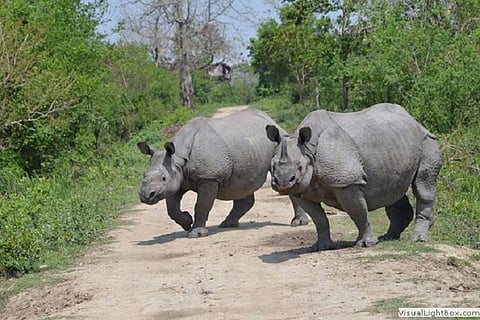

The National Tiger Conservation Authority (NTCA) has banned the BBC from filming in any of the tiger reserves of India for five years for portraying the park's conservation policies in poor light.
South Asia correspondent Justin Rowlatt of the BBC has also been banned, as per a report in The Times of India.
This comes just two weeks after the channel released a documentary titled "One World: Killing for Conservation" on February 11 questioning the protection measures taken by authorities at the Kaziranga National Park in Assam.
A piece titled "Kaziranga: The park that shoots people to protect rhinos", by Rowlatt was also published on the BBC's website.
The piece alleged that the park's "rangers have been given the kind of powers to shoot and kill, normally only conferred on armed forces policing civil unrest."
The NTCA called this a "breach of trust" and said that the channel had failed to submit the documentary to the Ministry of Environment, Forest and Climate Change (MoEFCC) and Ministry of External Affairs (MEA) for previewing.
The mandatory previewing, it said, is done "in order to remove any deviations, so as to achieve a balanced and accurate exposition of the theme".
According to DNA, the NTCA has also urged the ministry's wildlife wing to bar BBC from filming in any protected areas in the country for a period of five years.
The report further states that on February 13, two days after the BBC released the documentary, the NTCA served them a show-cause notice.
The notice stated that the channel had provided them with false information about filming the documentary with the "surreptitious malintent of obtaining permission from relevant authorities. The producer has used spasmodic events as an umbrella to judge a gamut of conservation efforts that go into safeguarding our wildlife heritage, with scant understanding of the laws in place. The immunity provided to forest officials under section 197, of the Criminal Procedure Code has been construed as a 'Shoot to Kill' Policy."
"It is suggested that the said producer Justin Rowlatt be blacklisted and the BBC be given a warning to adhere to clauses provided in clearances and approvals of government," the NTCA said.
The Duke and Duchess of Cambridge visited the Kaziranga National Park in 2016.
Kaziranga is home to around 2,400 one-horned rhinos, which constitutes two-thirds of the total population of this animal worldwide.
Rowlatt spoke to two guards at the national park who told him that they were "fully" ordered to shoot poachers. One of the guards told him that while he has shot at people twice during his four years of duty at Kaziranga, he hadn't killed anyone. However, he acknowledged" that even if he were to kill someone, it is unlikely that he would face any consequences.
"At one stage," Rowlatt wrote, "the park rangers were killing an average of two people every month- more than 20 people a year. Indeed, in 2015, more people were shot dead by park guards than rhinos were killed by poachers".
Meanwhile, The Hindu reported, MoEFCC has recommended the MEA to revoke the visas of both Rowlatt and his crew and also stop "their further entry into India for a period not less than five years".